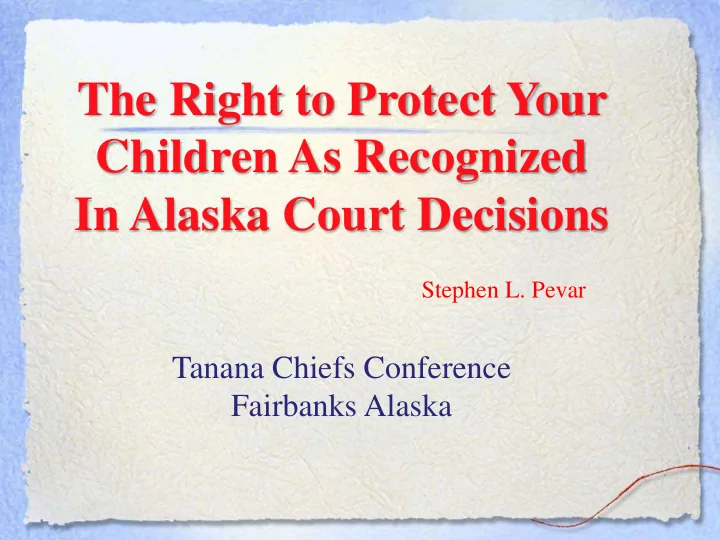

The Right to Protect Your Children As Recognized In Alaska Court Decisions Stephen L. Pevar Tanana Chiefs Conference Fairbanks Alaska
Alaska Court Cases 1. 1988: “There are not now and never have been tribes of Indians in Alaska as that term is used in federal Indian law.” Native Vill. of Stevens v. Alaska Mgmt. & Planning, 757 P.2d 32, 36 (Alaska 1988). 2. 1993: BIA includes Alaska Tribes on official list. 3. 1998: Land acquired through ANSCA is not “Indian country.” Alaska v. Native Vill. of Venetie Tribal Govt. , 522 U.S. 520 (1998).
Alaska Court Cases 4. 1999: John v. Baker , 982 P.2d 738 (Alaska 1999), the court overturns Native Village and recognizes Alaska Tribes as sovereign governments.
Alaska Court Cases 5. In John v. Baker and other decisions, the Alaska Supreme Court has recognized that Tribes in Alaska have the inherent right to exercise all powers of a sovereign that are not tied to a land base, such as (a) form a government; (b) determine tribal membership; (c) enter into agreements, including ISDEA; (d) regulate domestic relations, including child custody and ICWA matters.
Alaska Court Cases on Child Custody Issues Tribes in Alaska: 1. Can accept transfer of ICWA cases from state court. -- In re C.R.H. , 29 P.2d 849 (Alaska 2001) 2. Can initiate child custody proceedings. And tribal court orders are entitled to full faith and credit. -- Alaska v. Native Vill. of Tanana , 249 P.2d 734 (Alaska 2011) 3. Have the authority to terminate parental rights. -- Simmonds v. Parks , 329 P.2d 995 (Alaska 2014)
Alaska Court Cases on Child Custody Issues 4. Can determine child support obligations for tribal children. -- State v. Central Council of Tlingit & Haida Tribes of Alaska , 371 P.3d 849 (Alaska 2016) The issue is not whether a federal law expressly confers the right. “The key inquiry . . . [is] whether the tribe needs jurisdiction over a given context to secure tribal self-governance.” -- John v. Baker, 982 P.2d 738, 756 (Alaska 1999).
Recommend
More recommend